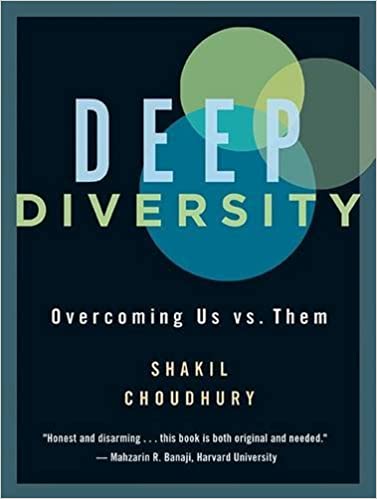
Deep Diversity – Overcoming Us vs. Them
In Deep Diversity. Overcoming Us vs. Them, Shakil Choudhury vividly presents his strategy for combating structural discrimination. It is a practical approach, which Choudhury and his consultancy agency Anima Leadership in Toronto, Canada, also teach in courses so that companies, schools and other institutions can apply ‘Deep Diversity’. The book explains the theoretical approach, which is significantly based on neurological research and psychological studies. In addition, Choudhury repeatedly offers impulses for personal reflection and action.
Although the Deep Diversity Method is applicable to different forms of discrimination, Choudhury pays particular attention to racism. He explains this focus through, amongst other things, his own biography: as a heterosexual, able-bodied man with South Asian roots who lives in Canada, he is himself affected by racism. He begins many of the chapters with anecdotes from his own life. In addition to providing a hook to prepare the reader for the theory that follows, he uses the anecdotes to demonstrate that combating structural discrimination requires a lot of critical self-questioning and active behavioural change.
The Deep Diversity approach speaks to the brain and the heart, i.e. to perception and emotions. Choudhury’s concept is based on research findings, which suggest that bias, fear and prejudice in thinking are closely intertwined with normal processes of perception, categorization, memory and learning. This predestines people for an ‘us’ and ‘them’ way of thinking. The Deep Diversity Method aims to understand, analyse and change this predisposition. Referring to brain research on primal leadership, Choudhury explains, for example, that right-wing and racist attitudes spread through emotional contagion. When someone in a leadership role is afraid of ‘the other’, this emotion easily spreads to people in that person’s immediate environment. In the book, Choudhury works with examples from the Canadian context, but the theory can easily be applied to the popularity of Brexit in the UK, or the right-wing Alternative für Deutschland party in Germany: the fear of a few, strong voices spreads to many other people, and sometimes leads to irrational and fatal decisions that reinforce social rifts.
To illustrate the impact of prejudice in real life, Choudury draws on studies showing that people with foreign-sounding names, for example, are 40% less likely to be invited to job interviews. The justice system, as well as the health care and education sectors are rife with examples of this. Choudhury explains: If prejudice is a belief, then discrimination is the action associated with it.
The situation is complicated by the fact that the belief – which is prejudicial – is psychologically anchored. People repeatedly develop psychological distortions and cultural myths, which even those who do not belong to the dominant group often internalize. Notions of good, evil, beautiful and ugly are associated with being Black or white. Certain cultures are seen as hard-working, others as lazy.
Choudhury moves from a basis of seeking to understand the internalisation of certain ways of thinking that lead to discrimination on an individual and institutional level. In addition, in each chapter of Deep Diversity, he presents skills to strengthen the relationship with oneself and others in a positive way. Choudhury recommends deep reflection on self-awareness, self-regulation, empathy and working on one’s own ability to deal with conflict, or meditation.
In the process of changing one’s own patterns of thought and behaviour, Choudhury recommends developing compassion for oneself. Because when people want to change habits or unlearn what they have learned, they are bound to make many mistakes along the way. People also acquire new tendencies: When they begin to perceive discrimination, it can become their sole focus. This usually doesn’t contribute to empowerment so much as to frustration.
Deep Diversity is a relevant book for those who want to better understand their own prejudices. It can also be adapted to serve as a guide to corporate and organizational structures if readers are willing. Especially the well-founded references to current studies certainly help to convince people who are critical of identity politics and prefer to orient themselves on ‘hard facts’.
Order the book here and support us! The work behind poco.lit. is done by us – Anna und Lucy. If you’d like to order this book and want to support us at the same time, you can do so from here and we will get a small commission – but the price you pay will be unaffected.

